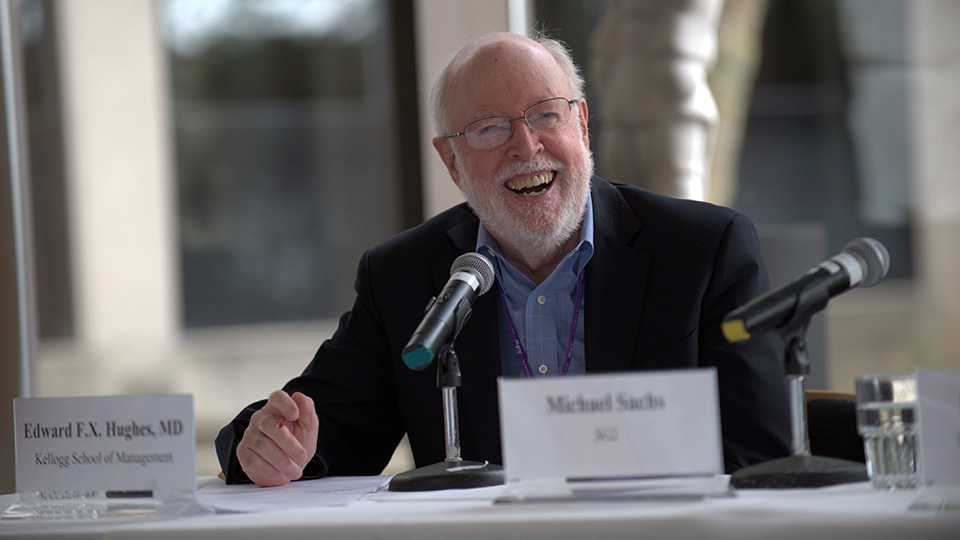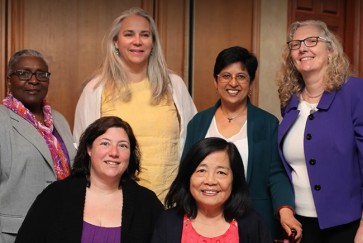Edward F.X. Hughes, a healthcare policy pioneer and professor of strategy at Northwestern University’s Kellogg School of Management, died Sunday, Jan. 23. He was 80.
Hughes founded the University’s Center for Health Services and Policy Research and served as its director for 17 years. He also served as the director of Kellogg's Health Enterprise Management Program and was the founder of Kellogg's joint MD-MBA Degree Program.
He was believed to have been the first physician to be tenured in a business school and served Northwestern for more than 45 years.
“I adored Ed Hughes,” Northwestern President Morton Schapiro said. “He was a great friend and advisor who worked tirelessly for the betterment of Northwestern. His transformative efforts to include faculty voices in the governing of the University have paid off mightily, and his countless devoted students can attest to his brilliance and to his humanity. Ed will be deeply missed.”
A surgeon by training, Hughes graduated from Harvard Medical School in 1966 and from Columbia University Mailman School of Public Health in 1969.
He played a central role in developing the Kellogg curriculum covering the pharmaceutical, biotechnology and medical device industries, and for many years was the co-director of the school’s biotechnology program.
In addition to his academic role, Hughes was elected president of the Faculty Senate for the academic year 2015-16. He also served in the formal office of past president for the Faculty Senate in the academic years of 2016-17 and 2017-18.
“Ed’s leadership in the Faculty Senate is still evident today, as he initiated its transformation into an effective forum for shared governance,” said Robert Hariman, a professor in the School of Communication. “No detail was too large or too small for his careful consideration, and his good humor, decency, and kindness were unmatched.”
“Ed leaves behind a profound legacy of advancing the study of health care at Kellogg. He was not only a talented physician, but also an admired teacher to countless students and a highly respected expert in the health care ecosystem,” said Kellogg Dean Francesca Cornelli. “I will always remember his kind smile. We extend our heartfelt condolences to his family and friends.”
David Dranove, the Walter McNerney Distinguished Professor of Health Industry Management at Kellogg, said Hughes’s reputation as an effective teacher was evident in the admiration of his former students.
“At every public event, there would be countless alumni seeking him out for advice, counsel or simply to offer a kind word,” Dranove said.
Phyllis Breit, Hughes’s assistant for more than 20 years, called him a mentor, friend and caring boss.
“Ed’s students grew to become more than just students as he would follow their life journeys since teaching and mentoring was his greatest passion,” Breit said. “Ed would work endless hours to get a job done and be sure it was done right with just the right verbiage because he knew people depended on him.
“You always knew where you stood with Ed and he knew how to admit when he was wrong — the sign of a true man,” Breit said. “Family and friends were always first and foremost and his new granddaughter was the light of his life; he honestly lit up when you mentioned Margot Lane. The world was a better place with Professor Edward F. X. Hughes in it, and he will be missed deeply by all who knew him.”
Throughout his career, Hughes underscored the need for health care professionals to develop management skills.
Joel Shalowitz, adjunct professor of preventive medicine at Feinberg first met Hughes in 1980. He said that back then there weren’t many models for what a physician could do other than clinical work.
“He expanded my perspective on teaching and research, highlighting the importance of management education to the delivery of quality healthcare,” Shalowitz said. “Students loved his teaching style, and he loved them back and continued to stay in touch with many of them long after graduation.”
Stephen Shortell, a professor of health policy and management at University of California, Berkeley, said Hughes’ work on healthcare policy “helped to put Kellogg and Northwestern on the map as one of the leaders in the field.”
“He will be remembered for his many contributions and the ripple effects of those he influenced will continue to live on,” Shortell said.
He is survived by his loving wife of 55 years, Susan Lane (Mooney) Hughes, Ph.D., of West Falmouth, Mass. and Evanston; his sons Edward Francis Hughes, IV of New York, N.Y.; and John Patrick Hughes (Kellogg, ‘05) of Arlington, Vir.; daughter Dr. Dempsey Lane Hughes of Evanston; daughter-in-law Kristen Welker of Arlington, Vir.; and granddaughter, Margot Lane Welker Hughes of Arlington, Vir. He also is survived by his sister, Elizabeth Craig of North Falmouth, Mass.; his brother, Paul Hughes of Sparta, N.J.; his sister-in-law Martha M. Mooney of Belmont, Mass.; and several nieces and nephews.
A wake will be held Thursday, Jan. 27, from 2 to 4 p.m. at the Chapman Funeral Home, located at 584 West Falmouth Highway (Route 28A) in West Falmouth, Mass. On Friday, Jan. 28, there will be a visitation from 10 to 10:45 a.m. and funeral services will be held from 11 a.m. to noon, all at St. Elizabeth Seton Catholic Church, 481 Quaker Road in North Falmouth, Mass. A burial will follow at North Falmouth Cemetery and a reception at 2 p.m. at the Sea Crest Beach Hotel, 350 Quaker Road in North Falmouth, Mass.
Plans for a memorial service at Northwestern are in development for Spring 2022.
In lieu of flowers, donations can be made in Edward’s name to Boston Latin School, Amherst College and the Coalition to Save Buzzards Bay.


